
|
|
|
|
Joseph Hansen: A Master of Mysteries |
|
Raj Ayyar: As a long-standing admirer of the Dave Brandstetter mysteries, I'm glad that Dave is not a clone of the hardboiled bourbon-swilling private eye. Your mystery fiction fits into the American private eye genre, but it's a loose fit. Any comments? Joseph Hansen: Dave used to drink bourbon, but his author switched to Scotch in 1974 when he lived in England and American whiskey was hard to get there. At some penthouse party in Manhattan in the 1980s, Tony Hillerman asked me with a grimace, "Hansen, how can you drink that stuff?" It's a fair question, but by then I'd taken to marveling that anyone could drink bourbon--it's so cloyingly sweet. Dave may have switched to Scotch with me. I don't remember. But if he did, the brand was probably Glenlivet, since that's the one I favor.
In Skinflick he gets in the way of a shotgun blast. And in Gravedigger someone forces his car off a mountain road. But for a long time he refuses to buy a gun, and afterward usually forgets to carry it with him when he's working on a case. You are, I hope, correct: Dave Brandstetter is not Mike Hammer, probably because his author is not Mickey Spillane. Raj Ayyar: More than Raymond Chandler, Dashiell Hammett, and other leading lights of the hardboiled genre, I detect a distinct echo of Ross MacDonald in your work. Are you influenced by him at all? Joseph Hansen: Chancing on a book of MacDonald's called The Doomsters in the late 1950s convinced me the mystery could be something far worthier than I'd thought. Yes, I learned a lot from reading Ross MacDonald. And Chandler. Hammett wrote better than either of them but having the biggest talent he also had the biggest drinking problem and it damaged his work to the point where he simply couldn't do it anymore. MacDonald, it turned out, had only one plot, which he simply recycled in book after book. His writing was, as Chandler observed, just a tad highfalutin. My books are nearest to MacDonald's in that like his mine are not about criminals, but about ordinary people who happen to commit crimes. Raj Ayyar: Do you think that Dave Brandstetter's gayness makes him less wooden and stupidly macho than his counterparts in straight private eye fiction? Joseph Hansen: It naturally made him apter to solve crimes involving homosexuals than a straight crime-solver, and the early books in the Brandstetter series dealt with the subject more than did the later ones. As I once told an interviewer, there were hundreds of mysteries that left out homosexuals entirely, why must I apologize if I added one a year that included them in the mix? Dave at work is just as sharp in sizing up straights as he is gays. In fact, toward the end of his career, he has gotten so good, he's a celebrity. Raj Ayyar: Do you think that recent gay-themed variations on straight- dominated genres--gay fairytales, ghost stories, whodunits etc. are likely to be restricted to a ghetto market? Will there be a day anytime soon when the straight middle class reader will curl up comfortably with a Dave Brandstetter mystery?
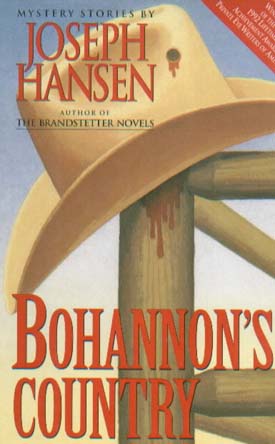 Joseph Hansen: Hey, straight middle class readers have always read Dave Brandstetter mysteries. That's why they were published by big mainstream houses like Harper, Holt, and Viking. That's why the series went on for years.
Joseph Hansen: Hey, straight middle class readers have always read Dave Brandstetter mysteries. That's why they were published by big mainstream houses like Harper, Holt, and Viking. That's why the series went on for years.
Serious sales for mystery novels cannot be built if your audience is a tiny fraction of an already specialized segment of readers. That was why I wrote them as I wrote them. "Always in good taste," the creaky old Saturday Review of Literature called them. They meant nobody got up to anything sexually graphic in my books. Admittedly, times have changed and sexually graphic sex is now all over the movies and television, and novels as well, even a few detective novels. I had written eight sexually explicit gay novels for the pulp market before I invented Dave Brandstetter. But I went low-key in those books, and successfully crossed over, and a new sub-genre was born! But to answer your question about a proliferation of gay books, I think writers should write about what they feel a need to write about. Way back before Stonewall, I was saying in the tiny gay magazines of those times that what we should strive for was inclusion in a society that had long shut us out. "Us and Them" is a lousy way to build a world. And I'm still not big on the idea of gay this, gay that, and gay the other. Of course, writers, artists, performers, will only do their best when they are doing what they feel the need to do. So, I guess if somebody is fulfilled by writing gay ghost stories, as distinct from the other kind, then fine. Why not? Henry James managed it. Raj Ayyar: What kind of advice would you give to a struggling young LGBT writer? Would you advise him/her to keep their writing 'straight- acting' as a survival strategy? Joseph Hansen: The bottom has fallen out of the market for gay books. Publishers aren't buying manuscripts, and are scrapping their backlists, gay bookstores are going belly-up all across the country. I had a saying I'd repeat to all my writing classes: "If writing means anything to you, it means everything to you." So write within the limits of what editors will buy until luck brings you the chance to write what is closest to your heart and to make a living from doing that. Change happens.
Joseph Hansen: I am old and too much alone. I needed something to do to keep me from sitting around moping. And I came upon a magazine article on blogging, and figured it might be the answer. Writing has always been joyous experience for me and it absorbs me so the time flies by. Editors won't buy stories and novels from me anymore. And you can't go emailing long thoughts to friends who have better use for their time. I could shape and send out blogs and if anyone read them, well and good, but if no one answered, it wouldn't bruise my feelings. It works. There's satisfaction in finishing an essay and posting it, and I'm soon busy planning another, reading, making notes, testing phrases. I try to keep away from old man stuff, but now and then I've written a childhood memory, and I'll probably write more. Then there's politics: which I won't write about unless I think I have something different to say. The same for gay issues. Raj Ayyar: Your blog has a remarkably trenchant analysis of the grand bungling that led to 9/11. Can you share your view of what 'really' happened on 9/11? Joseph Hansen: It was a horrifying proof of how little the West, but particularly the United States, understands other nations, their histories, religions, ways of life, their aspirations, their intents, their resentments and despairs. Western arrogance has never worked in our favor and, in the slow way of the epic of mankind, what is unfolding now is a payoff for our centuries-old contempt for our fellow mortals. Brutality begets brutality. I see no evidence that the West, the White House in particular, has a clue to what happened on 9/11 or why it happened, or pitifully of how to keep it from happening again. Raj Ayyar: What is your take on Michael Moore's Fahrenheit 9/11? Do you think it is a plausible analysis or a 'mere' conspiracy theory? Joseph Hansen: I haven't seen the film, but I've never thought Michael Moore much more than a sophomoric show-off. I don't think he understands George Bush and his cronies any better than they understand Osama bin Laden. Raj Ayyar: The U.S. occupation of Iraq is a real challenge to the liberal American dream of an America that stands for freedom, respect for difference and human rights. Can we ever defeat the neocons and other hegemony nuts and regain the innocence of a Whitman vision of America and the world? Joseph Hansen: Weren't we still slaughtering Indians when Whitman was roaring in the pines? Whose America was this, anyway? When did it become ours? And who, come to that, are we? Raj Ayyar: After the significant Lawrence vs. Texas victory, what next for LGBT communities? What are your comments on the anti-gay marriage hysteria sweeping so many different states? Is this part of a right wing backlash against the decriminalization of homosexuality? Joseph Hansen: The right wing makes noise out of proportion to its numbers. And with George Bush safely re-elected in November (and John Kerry seems hell-bent to see to that) they are likely to meet with disappointments. When politicians need a noisy, unruly, repulsive mob to get them where they want to be, those politicians will tell them any lies necessary, and make any promises they have to, but once they're in office, the mob has the door slammed in its face. Raj Ayyar: Are you planning any new Dave mysteries? Or, have you retired him for the good of the industry? How about a 'Return of...' in the good ol' Conan Doyle fashion?
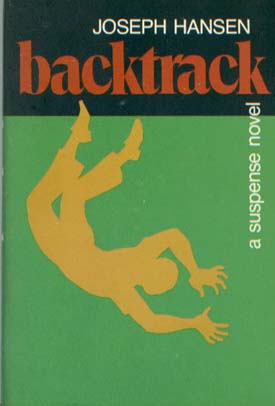 Joseph Hansen: Novels take months, sometimes years, to write. And at my age, how much time can a man count on? If a publisher offers me a chunky advance to write another Nathan Reed novel, I would probably perk up and do it. (Nathan Reed is my surrogate in three novels, Jack of Hearts, Living Upstairs, and The Cutbank Path.) But, let's not kid ourselves, no one is going to give me any money. I rely on Social Security, a little help from my friends, and the kindness of strangers. But thanks for asking.
Joseph Hansen: Novels take months, sometimes years, to write. And at my age, how much time can a man count on? If a publisher offers me a chunky advance to write another Nathan Reed novel, I would probably perk up and do it. (Nathan Reed is my surrogate in three novels, Jack of Hearts, Living Upstairs, and The Cutbank Path.) But, let's not kid ourselves, no one is going to give me any money. I rely on Social Security, a little help from my friends, and the kindness of strangers. But thanks for asking.
Raj Ayyar: Are you working on any other new projects? Any new directions for the blog? Joseph Hansen: I'm not working on it, but a few people in the picture business have been trying to get a film made from a novel of mine called Backtrack. But Development Hell is a vast place and this project has been there for more than three years already. Don't look for the movie at your neighborhood cineplex quite yet. As to books, Judith Markowitz writes about my work in her study of the Gay Detective Novel coming this fall. And I've written a foreword to the University of Wisconsin's upcoming reissue of Fadeout. Raj Ayyar: Is there anything else that you would like to share with readers of GayToday? Joseph Hansen: Whatever you choose to do in life, give it everything you've got, and hope hard that everything you've got turns out to be enough. Raj Ayyar: Thank you, Joseph. I've enjoyed interviewing you. |
|
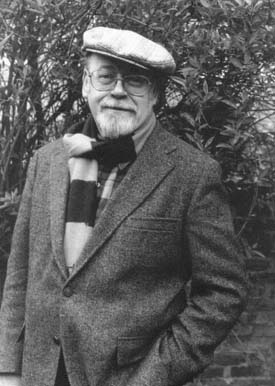 Author Joseph Hansen
Author Joseph Hansen 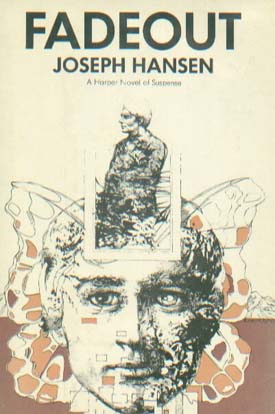 How hard-boiled is Dave? One of his lovers accuses him at some point of having icewater in his veins. He tries to use his brain in crises. I don't recall his ever losing his cool, except to grieve over the death of his first lover in Fadeout. Dave doesn't have many violent encounters, and when he does, most often he handles them briskly and comes out unharmed.
How hard-boiled is Dave? One of his lovers accuses him at some point of having icewater in his veins. He tries to use his brain in crises. I don't recall his ever losing his cool, except to grieve over the death of his first lover in Fadeout. Dave doesn't have many violent encounters, and when he does, most often he handles them briskly and comes out unharmed.
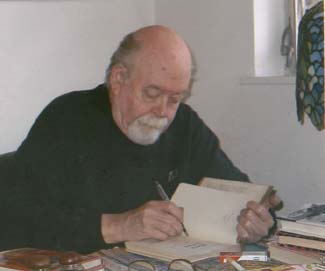 Raj Ayyar: Can you share some of the highlights of your blog with our readers? What made you decide to embark on a blogging romp?
Raj Ayyar: Can you share some of the highlights of your blog with our readers? What made you decide to embark on a blogging romp?